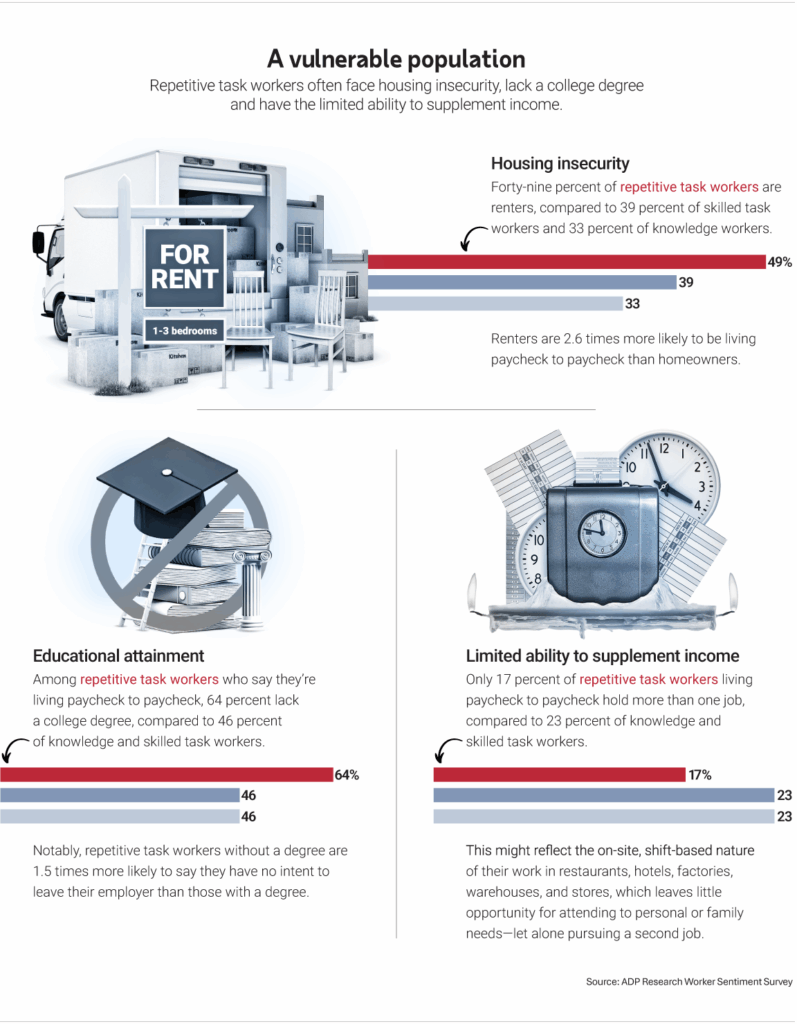Repetitive task workers: Financial strain and workforce dynamics
November 12, 2025
|

Struggling to make ends meet? You’re not alone.
Nearly two out of three workers say they’re living paycheck to paycheck. Since February 2024, our monthly Worker Sentiment Survey has tracked this trend, with an average of 64 percent of U.S. respondents consistently telling us that they are under financial strain.1The ADP Research monthly Worker Sentiment Survey collects data from a stratified, random panel sample of 2,500 workers in the United States.
While our survey doesn’t collect wage information or detailed financial data, workers who report living paycheck to paycheck also report lower productivity, weaker engagement, and greater stress. They’re twice as likely to be actively looking for a new job compared to workers who are more financially secure.
This sentiment spans all levels of workers. Even 58 percent of upper managers say they’re just getting by.
But one group stands out as feeling the greatest financial strain: Repetitive task workers.
Repetitive task workers are employees who work scheduled hourly shifts and carry out routine tasks on a regular basis.2Respondents are asked to describe their type of work by choosing from three options: I have a level of freedom to use my expertise to create something new. (Our definition of knowledge worker.) I use a level of expertise to solve similar problems each day. (Our definition of skilled task worker.) I do similar repetitive tasks each day. (Our definition of repetitive task worker.) Seventy-four percent of repetitive task workers report living paycheck to paycheck, compared to 61 percent of knowledge and skilled task workers.
Thirty-four percent of repetitive task workers in our sample are employed in accommodation and food services, transportation and warehousing, and retail and wholesale trade, sectors characterized by lower pay, fewer benefits, and limited scheduling flexibility.

What we found
It stands to reason that workers living paycheck to paycheck might seek better-paying jobs. Or even just better jobs: Repetitive task workers report the highest levels of stress, the lowest trust in leadership, and the least autonomy. They’re the least likely of all workers to say they love what they do.
However, repetitive task workers who are struggling financially are just as likely as other workers to say they plan to stick with their current job.3The Monthly Worker Sentiment Survey asks, “Which of the following best describes your desire to work for a different company?” Respondents select one of four responses: No intent to leave my organization; Not actively looking but would consider a new company if contacted by a recruiter or saw an opportunity; Actively looking for a new job; Actively engaged in the interview process for a new job.
This complex dynamic, where financial insecurity coexists with job retention, might be driven by the limited alternatives available to repetitive task workers, who tend to have fewer skills and more job constraints.
The takeaway
Repetitive task workers are more likely than other employees to struggle financially, yet they’re just as likely to stay with their employers as other paycheck-to-paycheck employees. This financial strain is linked to lower employee engagement, reduced productivity, and greater stress.
While economic conditions and low employee turnover might give employers little reason, or ability, to raise wages, investing in higher pay, if possible, could deliver long-term benefits such as greater productivity, improved employee well-being, and even more worker retention.




